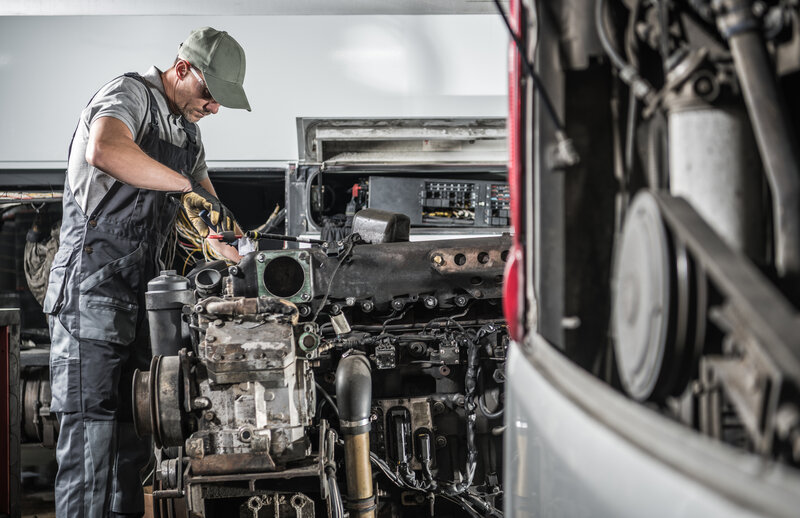
Whether you drive a large diesel vehicle for personal use or drive a truck for work, it requires routine maintenance to keep you safe on the road. Among the many components your vehicle needs to run is the alternator, so many drivers wonder, "How often should an alternator be replaced?"
The alternator is an important part of your vehicle's charging system and is responsible for recharging the battery while the engine runs. So it goes without saying that making sure the alternator is in good condition is essential for ensuring you have a fully functional truck.
The Bay Area's skilled mobile mechanic team at All Bay Diesel knows that it takes a lot to properly take care of a diesel vehicle. So we also know that replacing the alternator can be a significant endeavor. Fortunately, you really only need to replace this essential component if it's completely failing.
A good alternator should last you between 100,000 and 150,000 miles before the check engine warning lights pop up. Remember that if you drive your vehicle every day, the alternator will last longer than if you leave it parked for a while.
The unfortunate reality is that an alternator won't always give you warning signs before it fails. It can give out unexpectedly. Regardless, you should let a mechanic check out your vehicle whenever you experience issues with the alternator or engine.
An alternator problem can crop up out of nowhere, but other times, it will give you a few hints indicating that it might need replacement. For example, you might have a failing alternator if you notice any of the following issues:
One of the most obvious signs that your vehicle has a problem is when the red battery-shaped light turns on in the dash. This light can turn on for a lot of different reasons, but if it flashes intermittently, it's likely because of a failing alternator.
Another common sign that you have a failing alternator is dim headlights. To be more specific, if the lights are dim when the engine is idle but brighter when you rev it, you have an alternator problem.
This is because a failing alternator can't charge the engine battery enough, so the lights won't be as bright unless you rev the engine.
Every truck driver knows that if anything abnormal starts happening with your engine, you need to get it checked out as soon as possible. While a squealing engine could be due to a whole host of problems, a faulty alternator is one of the more common reasons.
If you hear the engine squealing while you have the truck or car running, schedule a service appointment right away.
When asking yourself, "How often should an alternator be replaced?" you probably also wonder, "How do mechanics know when to replace it?"
As we previously mentioned, alternators need replacing when they start to fail, which is typically every 100,000 to 150,000 miles. But before deciding to replace it, mechanics will test the engine to make sure the alternator is the problem and that it actually needs replacement.
Mechanics use a special tester to test a vehicle's battery and charging system. Essentially, this tool helps them determine how well the charging system performs.
Although useful, this test isn't always successful in testing for a failing alternator because an alternator that works intermittently can show up without issue on the test. However, mechanics know this and will typically recommend replacing the alternator to be safe since it can leave you stranded if it gives out completely.
Another way to test your vehicle's electrical systems and alternator is by using a voltmeter, which measures how much charging output your alternator has while the engine runs. Ideally, the voltmeter should read between 13.5 and 14.2 volts when testing the alternator.
There's no arguing that getting any part of your truck's engine replaced can be expensive. So it's important that you properly maintain your vehicle, not only to prevent the need for expensive repairs but to keep you safe on the road. But how can you maintain the alternator and avoid needing a premature replacement?
Aside from watching out for the signs of a failing alternator, you can take the following steps to ensure proper maintenance:
Additionally, if the time comes for you to replace your truck's alternator, go for a new one. Your vehicle is an investment, whether you use it for personal or business reasons. So you don't want to temporarily fix the problem or opt for a subpar solution just to save a few bucks.
Instead of installing a remanufactured alternator, install a new to. This not only gives you a better working life but also peace of mind.
Faulty car batteries and alternators can create a long list of problems for drivers. That's why it's essential to take your vehicle to an experienced mechanic who can fix the problem the first time.
At All Bay Diesel, we know how important it is for truck drivers to have safe, fully functional vehicles while hitting the road. When the check engine light comes on, or you notice charging issues with your vehicle, don't wait to get it looked at. Let us make sure your truck is road-ready and free of any major issues.
How often should an alternator be replaced? What are the signs of a failing alternator? Get your questions answered by experts by calling All Bay Diesel at (925) 522-1780.